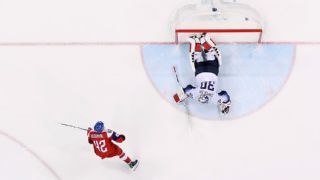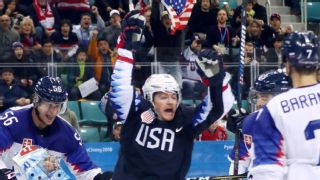|
It ended not with a miracle, but with a mewl: The United States men's team, a hockey superpower, was sent packing one game before the medal round by the Czech Republic on Wednesday. In Sochi, it was T.J. Oshie who saved the Americans' collective bacon with a shootout performance for the ages. In Pyeongchang, it was five different U.S. skaters attempting to match the Czechs and win the game in the shootout. The Americans went 0-for-5. And just like that, Team USA was eliminated, having gone 1-1-1 in Group B, then defeating Slovakia 5-1 in the qualifying round before getting humbled by the Czechs in the quarterfinals. How did we get here? Why wasn't Team USA ... better than this? Here are five reasons: 1. The blown power playThe worst part about that 3-2 shootout loss to the Czechs was that the game never should have reached a shootout. Vojtech Mozik took an ill-advised slashing penalty with 1:20 left in regulation and the game tied 2-2. The U.S. power play was clicking at over 20 percent for the tournament. The Americans not only finished the third period on the power play -- they also started overtime with a 4-on-3 man advantage for 40 seconds. They didn't register a shot. "We couldn't put it together. We looked scrambled in that key moment," captain Brian Gionta said in an understatement. It's hard to boil a game down to one moment, especially a game in which the Czechs had the better of the play. But with one goal separating them from the medal round, it's hard not to view this as the biggest blown opportunity of the tournament for the Americans. Yes, even more than their loss to Slovenia.  2. The Slovenia lossIn the end, Team USA's stunning 3-2 loss to Slovenia in the tournament opener didn't dramatically alter its seeding -- because of goal differential, it was likely headed to a first-round matchup with Slovakia anyway. But the nature of the loss was a humbling one for the Americans: after absolutely dominating play for about 30 minutes and expending all of their energy, they allowed Slovenia to hang around and then eventually gave up three unanswered goals to lose in overtime. With a team assembled from disparate parts, getting off the blocks with a successful effort was paramount. This was the opposite. 3. PreparationIt turns out teams need more than Google Hangouts, WhatsApp chats and five practices to jell before the Olympic tournament. Coach Tony Granato and his staff faced an unenviable task in getting Team USA on the same page in short order. This wasn't a bunch of guys from the NHL; this was a collection of players from the KHL, Finland, Germany, the AHL, the NCAA, unemployment and other far-flung regions. Which is to say that getting them all in the same place for a few practices before the Games was near impossible. Remember when Team USA and Canada would hold Olympic camps during the summer, before the Games? Good times. Unfortunately, the NHL's waltz with the International Olympic Committee made that kind of long-term planning rather difficult for these games. 4. They needed more Ryan DonatosOne of the true silver linings for Team USA in the 2018 Winter Games was the play of its college players. Ryan Donato of Harvard led the team with five goals and an assist. Troy Terry of Denver had five assists. Jordan Greenway of Boston University had a goal -- but more important, he was a dominating physical presence. "They are fearless. They are just kids having fun. A lot of guys are 12-13 years older than them, and when you see the fun and the attitude they play with, it rubs off on a lot of us," goalie Ryan Zapolski told ESPN. So why weren't there more of them? It was a calculated decision by the late Jim Johannson, GM of Team USA, and his brain trust. They felt a team made up of veteran players -- ex-NHLers and AHLers who played overseas and were familiar with the larger ice surface -- would be the safest play. They trusted them more. Yet the kids were the only bright spot on this team offensively. Imagine Team USA in this tournament with center Casey Mittelstadt, the Buffalo Sabres' blue-chip prospect currently with the Minnesota Gophers? Or Kieffer Bellows, a forward for the Portland Winterhawks? Or forward Brady Tkachuk of Boston University? Or defenseman Adam Fox of Harvard? Yes, between world juniors and the Olympics, they would have missed a chunk of the school year, and two tournaments in two months is a lot of hockey. But why not bring some of the most talented players eligible for Team USA to South Korea? "I look at it two ways," Johannson told USA Today last month. "How much hockey is too much hockey for these guys? And secondly, there is a big difference from what the world juniors are and what the Olympics will be. The world juniors is energy hockey and the Olympics will be played by older, experienced guys who play heavy hockey. [Mittelstadt] is obviously a wonderful talent, but I don't know that the Olympics are right for him at this time in his career." 5. They were hamstrung from the startI give Johansson, Ben Smith (director of player personnel), Granato and his staff an enormous amount of credit. The IOC and the NHL forced them to scramble and scrape together a team, figure out how they wanted to play and then populate the roster with random "where are they now?" players straight out of a 1990s sports comedy montage. We all know the Team USA that should have been here. This should have been a team that included Auston Matthews, Jack Eichel, and Johnny Gaudreau, as well as Patrick Kane, Phil Kessel and Joe Pavelski. Oh, what could have been ... Team USA made a few mistakes, in construction of the roster and execution on the ice. But in the end, they were just cooking with the ingredients they were able to scrounge up in a pinch. Hence, the bitter aftertaste.
|
